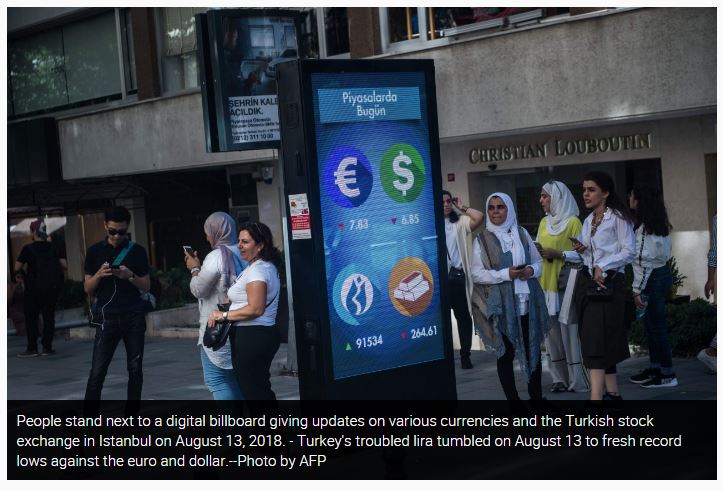Thailand shielded from Turkey rout
THE turmoil in Turkey’s financial markets presents only a limited threat to Thailand, according to the Bank of Thailand (BOT), but some analysts see the fallout for emerging markets causing moderate falls in the baht and the country’s trade surplus.
Chantavarn Sucharitakul, BOT assistant governor, said that the central bank has been monitoring developments in global money markets from Turkey’s problems, but that indications were for only a limited impact on Thailand’s money markets. This is due largely to the fact that there are few linkages Thailand and the financially troubled country in trade, investment and financing.
However, Jitipol Puksamatanan, a strategist at Krungthai Bank, said that concerns Turkey’s financial tailspin would sink other emerging markets over the medium term had not yet eased. Still, the currencies of Asian emerging-market countries, including China and Thailand, were little changed as investors holding Turkish lira typically do not hold the baht or the yuan.
In the past five trading days after Turkey’s market ructions, the lira slid 20 per cent, emerging-market currencies weakened 5 per cent and the baht depreciated only 0.16 per cent.
If a new emerging-market currency crisis occurs, the baht is forecast to weaken by 0.5-1 per cent against the US dollar – or about 15-30 satang. If Turkey’s predicament leads to a full-blown crisis, the baht will likely depreciate to 33.70 to the dollar, and that represents little impact, Jitipol said. In yesterday’s afternoon session, the baht rose to 33.27 to the greenback.
The baht is forecast to see a chance to, at most, weaken to 34.50 per US dollar in the third quarter of this year and move in a range of 33.20-34.20 in the fourth quarter and later appreciate to 32.50.

Bank of Ayudhya’s Global Markets Group projects the baht to move in a range of 33.20-33.50 to the dollar, while expecting the Thai economy to see limited direct impact from Turkey’s financial and economic upheavals.
However, it would be difficult for Thailand to avoid market volatility and indirect impacts from Turkey’s market turmoil as money markets are connected globally, the research unit said, expecting a low possibility for the crisis’s contagion to expand due to Turkey’s unique problems in economic imbalances, low foreign reserves and a US decision to double tariffs on steel imports from Turkey.
In Thailand, the research house said that there has been a signal for less necessity for monetary easing after the BOT’s Monetary Policy Committee decided to leave the policy rate unchanged.
The research house expects the MPC to raise the policy rate in the last quarter of this year.
Kasikorn Research Centre expects the baht to move in a range of 33.20-33.50 to the US dollar today, with the market keeping a close watch on the lira’s movements.
The Stock Exchange of Thailand (SET) has been hit indirectly by Turkey financial crisis, say experts.
The plunge in value of the Turkish currency has adversely affected emerging markets, including Thailand, said Prinn Panitchpakdi , managing director at CLSA Securities (Thailand).
The benchmark SET index yesterday dropped 10.61 points or, 0.62 per cent, from Monday, closing at 1,695.35 points. The trade value Bt54.24 billion, with foreign investors recording net sales of Bt2.14 billion, and institutional investors making net sales of Bt2.01 billion.
“Investors were worried about the contagious impact on emerging markets, so they pulled money out from riskier assets and relocated it to safe haven markets in developed countries,” said Prinn.
The threat of a trade war also played a role in dampening market sentiment, he said.
He expected it would be a short-term impact only as, previously, the SET Index had moved up from the 1,600 level to well over 1,700 points.
Anusorn Tamajai, dean of Rangsit University’s economics faculty, said both the Turkey crisis and trade dispute between the United States and China had hurt the Thai stock market. The impact from Turkey would be limited, he added.
Soraphol Tulayasathien, a senior economist at Finance Ministry, said that any impact would be small as the Thai economy does not depend much on foreign borrowings and the country has a large current account surplus.
“Trade relations between Thailand and Turkey are not large, with Thailand’s exports to Turkey making up only 0.5per cent of the total exports and imports from Turkey were only 0.1 per cent of total Thailand’s total imports in 2017,” Soraphol said.
Source: http://www.nationmultimedia.com/detail/Economy/30352149


 English
English




